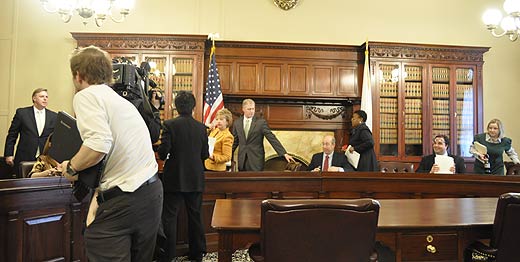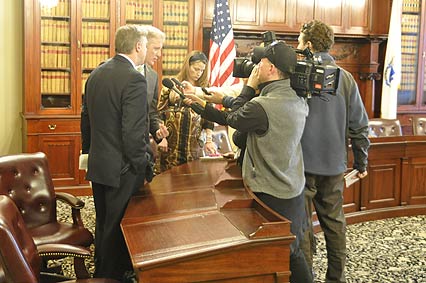Mass. Legislature committees act on major
pro-family
& anti-family bills - one day before deadline.
Here's what happened . . .
Extensions applied for some. Others go to "study". Transgender bill still alive.
(See list below)
POSTED: March 17, 2010
The Judicial Committee, Education Committee, Public Health Committee and others met in executive sessions yesterday (March 16) to decide the fate of major pro-family and anti-family bills filed last year, at the beginning of the session. Today was the deadline for acting on bills or asking for an extension. But since today (March 17) is "Evacuation Day" -- a legal holiday for public employees -- they did it yesterday.
This year there were more crucial bills than usual, both good and bad, affecting the pro-family movement. And the Legislature has been getting a lot of pressure from both sides.
The homosexual lobby is focused pushing the transgender agenda as hard as they can. And the fact that legislators tried to slip in language into the anti-bullying bill apparently targeting MassResistance directly is evidence that we're at least making them a bit uncomfortable. (See our recent report on the "anti-bullying" bill.)
Here's what happened
The short answer is that a lot of good and bad bills are still alive, at least for the time being. Others were sent "study", which is usually (but not always) a bill graveyard.
STATUS OF BILLS (GOOD and BAD):
1. Sent forward with favorable report:
H402 Re-write of Planned Parenthood Bill (Education Comm.)
Note: This bill is a completely watered-down version of the original Planned Parenthood bill. It doesn't mandate anything, just a "study" by a state agency! We consider this a victory -- owing to our constant pressure against the original version!
2. Applied for extension of time until May 7 to decide (i.e., still alive).
All in Judiciary Committee:
H1337 Stop schools from providing pornography to children
H3840 Repeal buffer zone at abortion clinics
H1728 Transgender Rights and Hate Crimes Bill
H1468 Physician Assisted Suicide Bill
H1746 Remove parental consent on abortions for minors
H3536 and S1656 Repeal sodomy laws and other morality laws
3. Sent to a "study":
H406 David Parker Parents' Rights Opt-In Bill (Education)
H145 Disband Mass. Commission for GLBT Youth (Children, Families)
H 1670 Woman's right to know [re: abortion] (Judiciary)
H 437 Alternative Parents' Rights Opt-In Bill (Education)
H485, H 472, H 485, H 421, H403 -- Other less effective parents rights bills filed this session. (Education)
H1708 Officially legalize homosexual "marriage" (Judiciary)
H2174 Create tax-funded "community based" Planned Parenthood clinics (Public Health)
There's definitely a lot of work still to go.
What's behind these decisions? We think it reflects both the hostility of certain politicians against parents' rights and traditional values, weighed against their uneasiness with controversy and pressure from our side, causing them to pick certain legislative battles on the "social issues" and leave others by the wayside.
Background: How bills go through committee
A bill before the Legislature is first sent to a committee. The committee holds a public hearing on the bill. After that the committee must decide to either move the bill forward to the floor of the Legislature -- or send it to a "study" (which is usually a graveyard).
Since thousands of bills are filed each year, most of them end up in a study. A "study" is effectively a graveyard, but occasionally bills get resurrected from there if there is enough interest (or pressure). A recent example of that was the "1913 Law" bill last session, which was sent to a study then months later brought back to life.
Generally, this decision is made in a special committee meeting called an "executive session", where dozens of bills are voted on by the members. At least that's the theory. In practice, the committee chairman make the decisions and the members basically do what they're told and don't appear to be in the decision process at all. As we describe below, this time was no different.
Tuesday's executive sessions: Not a pretty picture at all
We attended the executive sessions of the Education Committee and the Judiciary Committee. It was a pretty ridiculous thing to watch. Even though they were dealing with dozens -- actually hundreds -- of very important bills (not only ours!) many of which could have big effects on public policy, neither of these sessions, which are ostensibly "decision making" meetings, lasted more than ten minutes.
| |
 In and out. The Judiciary Committee executive session, to decide the fate of over 200 bills, took less than ten minutes. By the time we got our camera set up they had already adjourned the meeting and were leaving.
In and out. The Judiciary Committee executive session, to decide the fate of over 200 bills, took less than ten minutes. By the time we got our camera set up they had already adjourned the meeting and were leaving.
|
Hardly any of the committee members even bothered to show up. And in fact very few members of the public showed up either, rather odd given the huge outpouring at some of the public hearings. There were maybe ten people (including reporters) watching the Judiciary Committee meeting. At the Education Committee hearing there were just a handful of people watching, and about half of them were connected with the teachers' union. That's too bad because the psychological effect of visible pro-family presence is important. (They definitely noticed us!)
As soon as the meetings started one of the chairmen would rattle off some bill numbers, announce their decisions on them, and the "vote" was declared. No one objected or even initiated any discussion. At the Judiciary Committee meeting they didn't even vote on bill numbers. The chairman would refer to "lists" of bills, and they would "vote" on those lists.
After Tuesday's meetings we called the offices of two of the Judiciary Committee members. We were told they hadn't even been given the lists of bills their own committee had voted on. Nor did they seem particularly interested in it. One wonders why the Legislature bothers to put on such a charade.
Stonewalling, stalling, concealing
Trying to get the results was, well, bizarre. When the Judiciary Committee "voted" during their executive session they did not name any bill numbers, just unidentified "lists" of bills. But after the meeting when we asked to see the actual lists they refused to provide them! They said that the lists "aren't being released to the public." Even the State House News reporter told us he couldn't get them! It was unbelievable; no one had ever heard of that. Later we persuaded a Judiciary Committee staffer to read us the results of our specific bills. Eventually we were told we could come in Wednesday and pick up a list but they couldn't fax it or email it to us. It wasn't easy.
The Education Committee meeting was also very strange. As the meeting began the chairman announced that no video or sound recordings of the session would be allowed. But the 9-minute meeting was so dull and bland that no one would be interested in it anyway -- except to marvel at how superficially and insincerely they do their business. That's probably what they wanted to keep from being posted on a Web site! (But at least they provided us the lists of the bills without any problem.)
The arrogance of these legislators is quite incredible.
The next stop for bills: On to the House and Senate
Once bills get out of committee, things can get a little complicated. A lot of the bills go to other intermediary committees which can modify them and/or send them to the full House and Senate for a vote, and then finally to the Governor's office.
The official legislative session ends on July 31, so in general bills must be passed by the House and Senate by then, though they can be signed by the Governor afterwards. (The original Parents Rights Bill was finally passed on the afternoon of July 31, after a huge amount of pressure by parents.) However, they can meet in special sessions until December 31, so anything can happen. This year being an election year, of course, makes things interesting.
| |

Shallow media interest. The only thing that interested the reporters -- of all the bills in question -- was the bill on removing Bunker Hill Day from the list of holidays for public employees. Right after the Judiciary Committee meeting Sen. Jack Hart (D-South Boston), on left, tells Ch. 5 that "It's not a hack holiday. Real people died in American history." Next to him, agreeing, is Rep. Eugene O'Flaherty (D-Chelsea).
|
We will continue to monitor these bills.


 In and out. The Judiciary Committee executive session, to decide the fate of over 200 bills, took less than ten minutes. By the time we got our camera set up they had already adjourned the meeting and were leaving.
In and out. The Judiciary Committee executive session, to decide the fate of over 200 bills, took less than ten minutes. By the time we got our camera set up they had already adjourned the meeting and were leaving. 